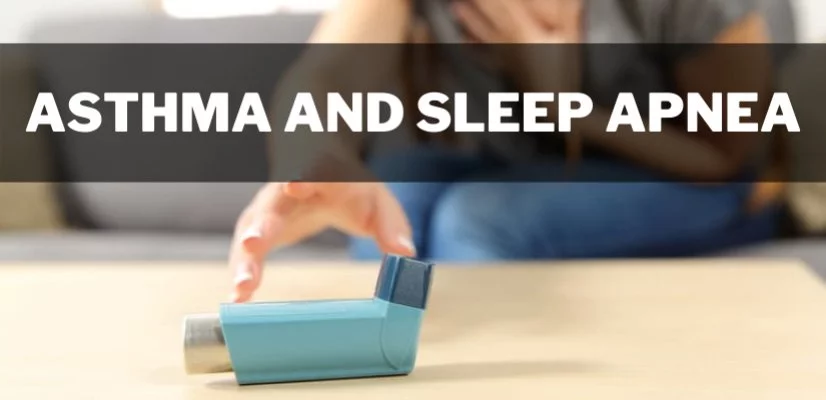Asthma and Sleep Apnea
You might believe that asthma and sleep apnea are unrelated diseases. In contrast to sleep apnea, which naturally only happens at night, asthma generally flares up during the day, such as after exposure to a trigger or during an athletic event (or when someone is asleep).
But you might be surprised to learn that asthma and sleep apnea are linked. Both of these lung disorders could have an effect on your body at any time of day or night. Additionally, they can exacerbate and worsen one another. What should you do if you’re in danger and how precisely are they related?
Relationship between Sleep Apnea and Asthma
The prevalence of both asthma and sleep apnea is very high. Sleep apnea, which affects more than 36 million Indians, affects 1-4 percent of children, while asthma, which has increased since the 1980s, affects more than 30 million Indians, including 8.3 percent of children.
Due to rising levels of smog, allergens, particles, and irritants in the lungs, these disorders are becoming more prevalent in people of all ages and demographic groups. Another risk factor is obesity, which is becoming more prevalent in both children and adults.
How Asthma Affects Sleep Apnea
Even though asthma is typically thought of as a daytime disorder, nighttime symptoms can potentially get worse. When nocturnal asthma strikes, the airways find it difficult to deliver enough oxygen to the lungs, which can lead to episodes of coughing, chest tightness, breathing difficulties, and wheezing when you’re trying to fall asleep. As a result, the airways may eventually become congested and inflamed.
Nocturnal asthma may or may not cause you to fully awaken, but as your body struggles to resume normal airflow, these interruptions disrupt your regular sleep and prevent your body from receiving the necessary oxygen and rest, very much like how sleep apnea prevents your body from receiving restful sleep. Both of them have the potential to cause weariness and impaired focus.
Severe asthma can lead to bouts of apnea, or stopping breathing for brief periods while you sleep, which can cause low oxygen levels, sleep deprivation, high blood pressure, diabetes, stroke, heart attacks, weight gain, depression, and a host of other health issues.
How Sleep Apnea Affects Asthma
Your body responds to sleep apnea by increasing your heart rate and blood pressure, which may lead you toss and turn during the night. Additionally, there may be reflux—the backward flow of stomach acid into the oesophagus, which connects your mouth to your stomach—which can irritate your lungs if it enters your neck and airways. This is one of the reasons it’s crucial to avoid eating two to three hours before bed because reflux is less likely to occur on an empty stomach.
As acid reflux irritates your throat and airways, your lungs could become irritated, which would make it harder to take in oxygen. Your lungs may become extremely sensitive and reactive to allergens, fumes, and changes in the weather as a result, which may exacerbate asthmatic symptoms. It may even cause uncontrolled asthma, which can damage the lungs and leave scarring behind. Uncontrolled asthma requires higher dosages of daily and emergency medications.
Lack of sleep can weaken the immune system and increase susceptibility to everyday stressors, which can lead to a vicious cycle of ill health and insufficient sleep. Additionally, persons with sleep apnea may experience headache, dry mouth, irritability, and weariness upon waking.
How can a CPAP machine help?
A continuous stream of air from a continuous positive airway pressure (CPAP) machine maintains your airways open throughout the night so that your body can obtain enough oxygen, enjoy a good night’s sleep, and allow your body to repair.
People who start CPAP therapy report a range of advantages, including less stress, more energy, better moods, increased insulin sensitivity, stronger immune systems, and more. By lowering airway inflammation and other asthmatic symptoms, CPAP can also assist treat poorly managed asthma.
Preventing Sleep Apnea and Asthma
It is crucial to actively manage sleep apnea and asthma in order to contribute to taking back your life from these disorders. Use your CPAP machine every single night and take your medications as prescribed. A minimum of six to eight hours should be slept on each night.
Change just a few aspects of your lifestyle to enhance your general health.
Consider keeping an eye on your diet. To lose weight, cut back on your intake of sugar, carbohydrates, and junk food and choose healthy alternatives like fruit, vegetables, nuts (if you are not allergic), seeds, and whole grains.
Additionally, go for a brisk walk, swim, ride a bike, or use a stationary bike to engage in moderate activity at least three times each week.
Disclaimer
The information provided is for general knowledge only. Consult your doctor for personalized advice and treatment. Medikart HealthCare not liable for any actions taken based on this info.

